|
|
|
Sort Order |
|
|
|
Items / Page
|
|
|
|
|
|
|
| Srl | Item |
| 1 |
ID:
138297
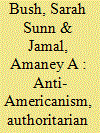

|
|
|
|
|
| Summary/Abstract |
A pillar of American foreign policy in the Middle East since September 11, 2001, has been promoting democracy, with particular emphasis on support for women's representation. Given high levels of anti-Americanism in the region, does foreign pressure for policy reform undermine this project? Evidence from a nationally representative survey experiment in Jordan shows that an American endorsement of women in politics has no average effect on popular support for women's representation. Instead, domestic patterns of support and opposition to autocrats determine citizens' receptivity to policy endorsements, with policy endorsements of foreign-supported reforms polarizing public opinion. Both foreign and domestic endorsements of women in politics depress support among Jordanians who oppose their regime significantly more than among Jordanians who support it.
|
|
|
|
|
|
|
|
|
|
|
|
|
|
|
|
| 2 |
ID:
190937
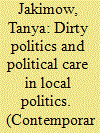

|
|
|
|
|
| Summary/Abstract |
Politics is dirty’ is a truism, a taken-for-granted reality in much of the world, particularly in India. Its implications are likewise seen as inescapable. Scholarship examining women’s political underrepresentation often cites the ‘dirty’ nature of democratic politics as a key disincentive for women to participate. While not disputing that politics is, in some respects, ‘dirty’, I question the mechanisms through which it is said to hinder women’s political representation. Drawing upon ethnographic research with female party workers and elected municipal councillors in Dehradun, North India, I analyse how ‘dirty politics’ positions women as ‘out of place’ within the political realm. While both men and women engage in acts of political care, men can more easily transgress the boundaries between them, straddling both ‘dirty politics’ and a ‘politics of care’. This production of the ‘political’ as a realm unsuitable for women or mismatched with their activities, is one factor contributing to the underrepresentation of women in politics in South Asia, and beyond.
|
|
|
|
|
|
|
|
|
|
|
|
|
|
|
|
| 3 |
ID:
174010
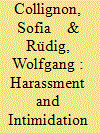

|
|
|
|
|
| Summary/Abstract |
The use of political violence to attain political goals has long been a source of concern. Once thought to be exclusive to countries with high levels of general violence, recent evidence suggests that harassment and intimidation of political elites in the UK is more widespread than previously thought. Using data from the 2017 general election candidate survey, we find that four in every ten candidates experienced at least one type of harassment. Evidence suggests that women and young candidates are more likely to suffer from harassment and intimidation. We conclude by formulating an agenda for future research, focussing, in particular, on the perception of harassment and the effect of harassment on political careers.
|
|
|
|
|
|
|
|
|
|
|
|
|
|
|
|
| 4 |
ID:
152244
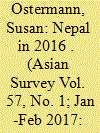

|
|
|
|
|
| Summary/Abstract |
Despite general government stagnation and exceedingly slow earthquake recovery efforts, Nepal in 2016 made some important and long-overdue advances in terms of securing a role for women in politics. The country also maintained its independence from its closest ally, India, and, in so doing, improved relations with China.
|
|
|
|
|
|
|
|
|
|
|
|
|
|
|
|
| 5 |
ID:
025048
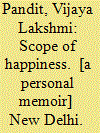

|
|
|
|
|
| Publication |
New Delhi, Vikas Publishing House Pvt Ltd, 1979.
|
| Description |
xvii, 333p.Hbk
|
| Standard Number |
0706910141
|
|
|
|
|
|
|
|
|
|
|
|
Copies: C:1/I:0,R:0,Q:0
Circulation
| Accession# | Call# | Current Location | Status | Policy | Location |
| 018431 | 923.254/PAN 018431 | Main | On Shelf | General | |
|
|
|
|
| 6 |
ID:
088312
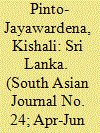

|
|
|
| 7 |
ID:
144810
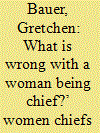

|
|
|
|
|
| Summary/Abstract |
Across the globe women are accessing national legislatures and executives in unprecedented numbers. Over the last 25 years several African countries have led the way in women’s representation in parliaments and, more recently, in cabinets. At the same time, governments and foreign donors are increasingly focusing on the role of traditional leaders in local-level politics as states democratize and decentralize across the continent. Once considered hopelessly undemocratic and patriarchal, traditional leaders are more recently viewed in many African countries as one half of a viable and effective hybrid system at the local level. In addition, whereas the role of chief has been largely the preserve of African men, African women are increasingly asserting a right to become chief. This article, using Botswana as a case study, suggests that the increased presence of women in national legislatures and executives may be having a symbolic representation effect on African women who are insisting that they too may access political power, even in positions formerly unavailable to them, such as chief. This article further suggests that, like their women counterparts in African parliaments, once they gain access to political office, women chiefs may substantively represent women’s interests, in venues such as a House of Chiefs and in their communities.
|
|
|
|
|
|
|
|
|
|
|
|
|
|
|
|
| 8 |
ID:
170882
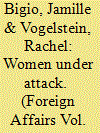

|
|
|
| 9 |
ID:
189700
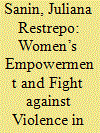

|
|
|
|
|
| Summary/Abstract |
Rates of gender-based violence in Latin America are high, but so is the number of women in national parliaments. This article analyzes that apparent paradox, paying attention to feminist and women’s rights mobilization in the region, the role of women in politics, and the development of legislation to address violence against women. Despite a comprehensive reshaping of the legal landscape, there are significant challenges to the implementation of these laws, including violence against women in politics. But feminist transnational activism continues to call for action.
|
|
|
|
|
|
|
|
|
|
|
|
|
|
|
|
|
|
|
|
|